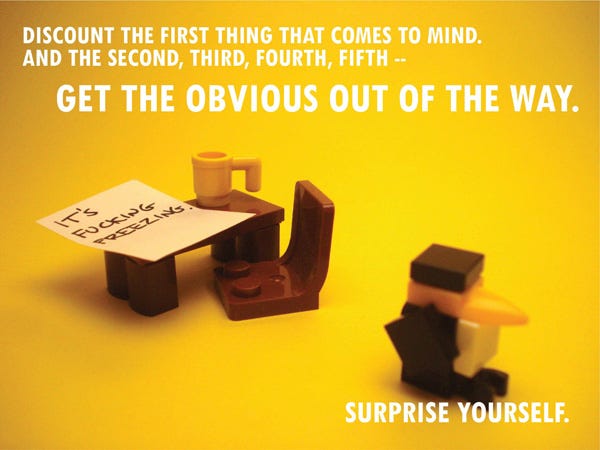Do we need citizen assemblies for our energy transition?
We need creative deliberation that is also inclusive
Dear folks,
a little while ago, a Dutch governmental committee on “citizen involvement in climate policy” came out with a recommendation for a citizens’ assembly for climate and energy.
In response, Thijs ten Brink, a prominent voice in the Dutch debate on clean energy put forward the following request.
Dear network: who will help me come up with a decisive argument to design the environmental procedures for energy projects completely differently than the procedures for building highways, pigsties, distribution centres and airports?


Several people responded, but – according to Thijs – they died glorious deaths on the hill of his Twitter thread. Since at the time I was just concluding my triptych on wind, I felt I had something to add. But then life happened. Life stopped happening for a spell though, so, now, my very belated ascent to the battleground!
Why do we need different procedures?
Reason 1: because the current rules don’t appear to be working.
Why? A little psychology and a little sociology can explain.
In the classic article on environmental justice I covered last issue, Catherine Gross interviewed people who had in some way been part of the decision-making process for a number of turbines in New South Wales. Her conversations made clear that people needed some fairly basic guarantees – basic but fundamental – to feel the decision had received due process. Due process didn’t mean meeting their own special interests; instead, they realized that there are different interests in the community and they “simply” wanted these interests to be weighed in a fair manner. If they felt the process was fair, then they would also “accept the outcome and be satisfied with it”, in other words, consider it legitimate.
What did they mean by a fair process? Well, one in which they are be able to fully participate in the process. In other words:
Have the ability to express opinions freely and to be heard,
Be treated with respect,
Be given adequate information,
And have an impartial decision maker facilitate the process.
The psychology is this: such ‘full’ participation makes it possible for people to be and feel recognized in their needs, interests and emotional attachment to the site or issue in question.
Sociology, meanwhile, helps us understand that inequalities of access, status, and capabilities get in the way of everyone’s full participation. Some people catch wind of the project sooner than others (did you catch my pun?) and get a say in its formative stages, some people’s voices sound louder than others’, and the consultation process might favour technologically or bureaucratically savvy participants over others. (And that’s just the differences among citizens. We haven’t even started on primary stakeholders stacking the cards in their favour.)
Actually existing decision-making processes therefore regularly fall short of their democratic intent. They certainly seem to for wind, leaving very few people recognized and satisfied; and they probably already didn’t for those ‘classic’ planning cases either.
We therefore need innovative - or rather, more precisely, necessarily creative ways to put Gross’ precepts for full participation into practice. I’ll come back to this in a bit.

Reason 2: renewable energy is different from other infrastructural projects
The general inadequacy of participatory procedures shows especially in polarized topics and with technology that is the linchpin of a fundamental reorganization of our society – and wind power is an example of both. Firstly, in polarized issues, the inequalities that skew ordinary participation now completely skewer the heart of participatory procedures. The need for procedures that can safeguard recognition and foster creative compromise is all the more urgent in these cases.
Secondly, when planning decisions transcend ordinary amendments within the received order of things, ordinary decision-making can’t rise to their level. In the case of renewable energy, as societies, we need to grapple with two things: the fact that switching to renewables is an existential need and that doing so has significant consequences for our landscapes.
Let me just emphasize this point. If we can't make renewables work, many people will die, countless people will lose their homes, and the world will become a much less secure and liveable place. So, can we let the fate of renewables – our key to a people-friendly planet – hang on consultation methods that have proven inadequate in many ways?
In short: wind turbines are not the same as the extension of a highway.
So, what do we need?
Fair process and a John Lennon song.
As a preamble, we need experimentation. While we know business-as-usual falls short in key areas, we don’t yet know what brings more success.
Let’s review 3 possibilities. First, the citizens’ assembly, because that is what started off this whole question.
Citizens’ assemblies are definitely still an experiment, but their promise to remedy the shortcomings of traditional participation procedures has a sound theoretical grounding (and some good initial evidence). If done well, they respond exactly to the precepts of full participation:
Give voice to a diversity of people who (as a collective) have no direct stakes in the matter
Take them seriously by giving them a strong mandate
Give them time and space to absorb as much information as necessary
Lead the proceedings through an impartial third party
Note that while technical expertise plays an important role in this set-up, the experts don’t make the decisions – there’s nothing like technocratic procedures to sap the life out of a democracy (or rather fuel the flames of democratic dissent – you can’t kill the idea of governance by and for the people, yeah! ✊).
So, the citizens’ panel scores high on fairness, but it also does well on collective reimagination. It allows participants to ask big questions about where the polity is going.
(Big questions.)
The People’s creativity
Speaking of imagination, sometimes you don’t want people to make a decision straight away, but you want to create a public space for reflection. To rally a community around a problem, to allow them to redefine and reappropriate it, and embolden them to create a vision for the future. Storytelling techniques are a great way to do this, because they democratize difficult topics and technical language and let people step into one another’s shoes for a bit, which is great if you want to “hold diversity” (Mourik et al. 2021).
Once you get into the nitty-gritty though of making actual decisions though, you don’t want to give up on that creativity, nor on the sense of shared responsibility. This is where the co-production approach to public participation comes in, which Helena Solman introduced to me last issue. Allowing people to co-produce renewable infrastructure means giving them far greater say (and responsibility) over the design. While that may look messy on paper and certainly requires new moderation skills, it is also potentially greatly rewarding, because you unlock (read: unleash if you live in Silicon Valley) a collective creative problem-solving capacity.

Good enough procedures?
Does the promise of these alternative approaches to public deliberation mean that we should do away with the canon of public consultation? Well, I think there is still a case for the good enough procedure, which works well enough for most people most of the time. This should work especially in cases where the stakes are relatively low, like smaller scale planning and zoning.
However, with Reasons 1 and 2 I’ve argued that stock public consultation techniques for wind and other (substantial) sustainability infrastructure do not meet the criteria of good enough procedures: they systematically leave people dissatisfied and the consequences are too far-reaching for us to be complacent about that dissatisfaction.
I’ll be curious to know if you think I’m still standing. Drop me a line, and take care,
Marten

Some excellent thoughts on due process, which is always a difficult balance between inclusiveness and speed & effectiveness. As you rightly point out, I think the key is to have a truly impartial lead for the proceedings.